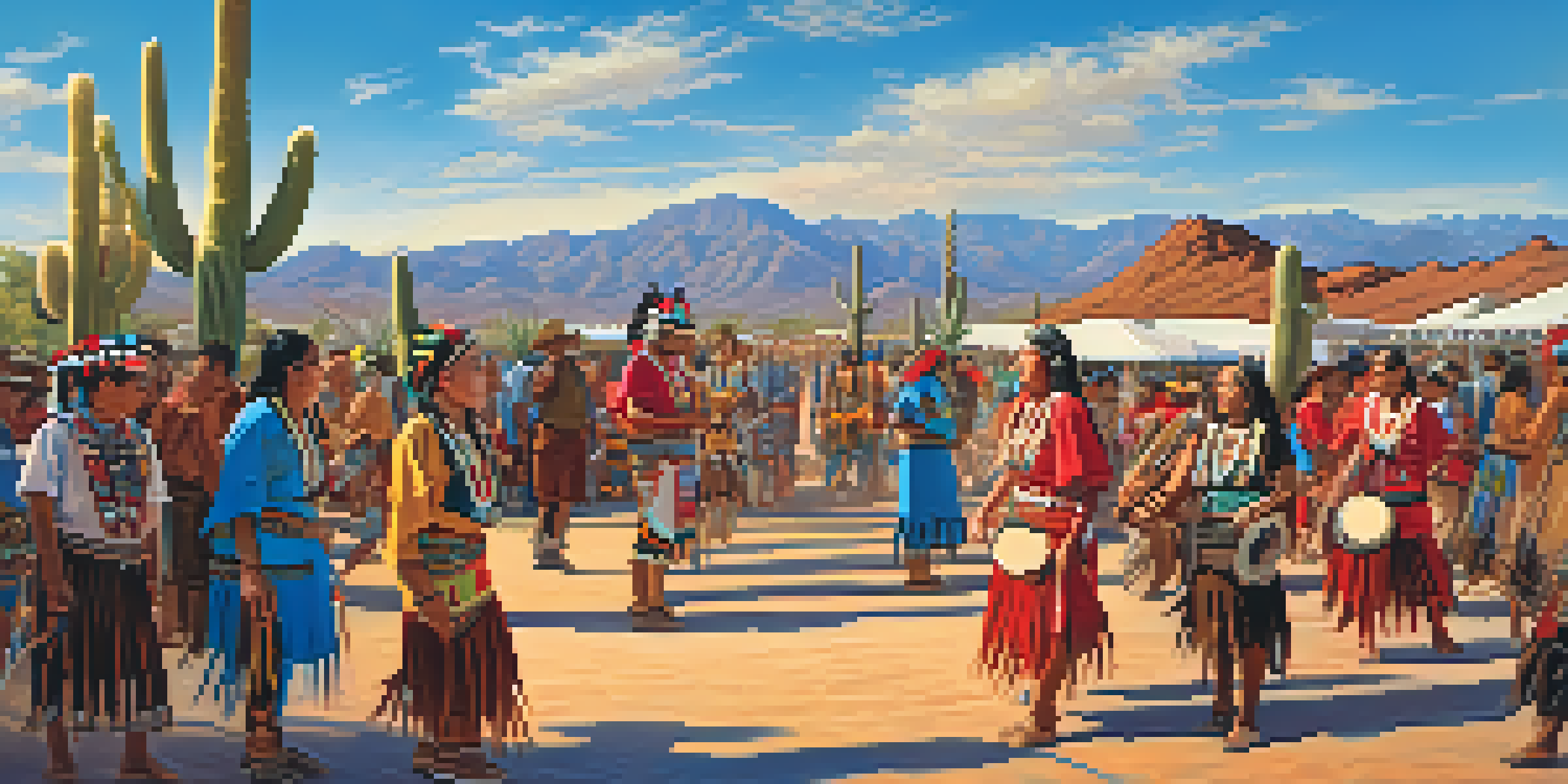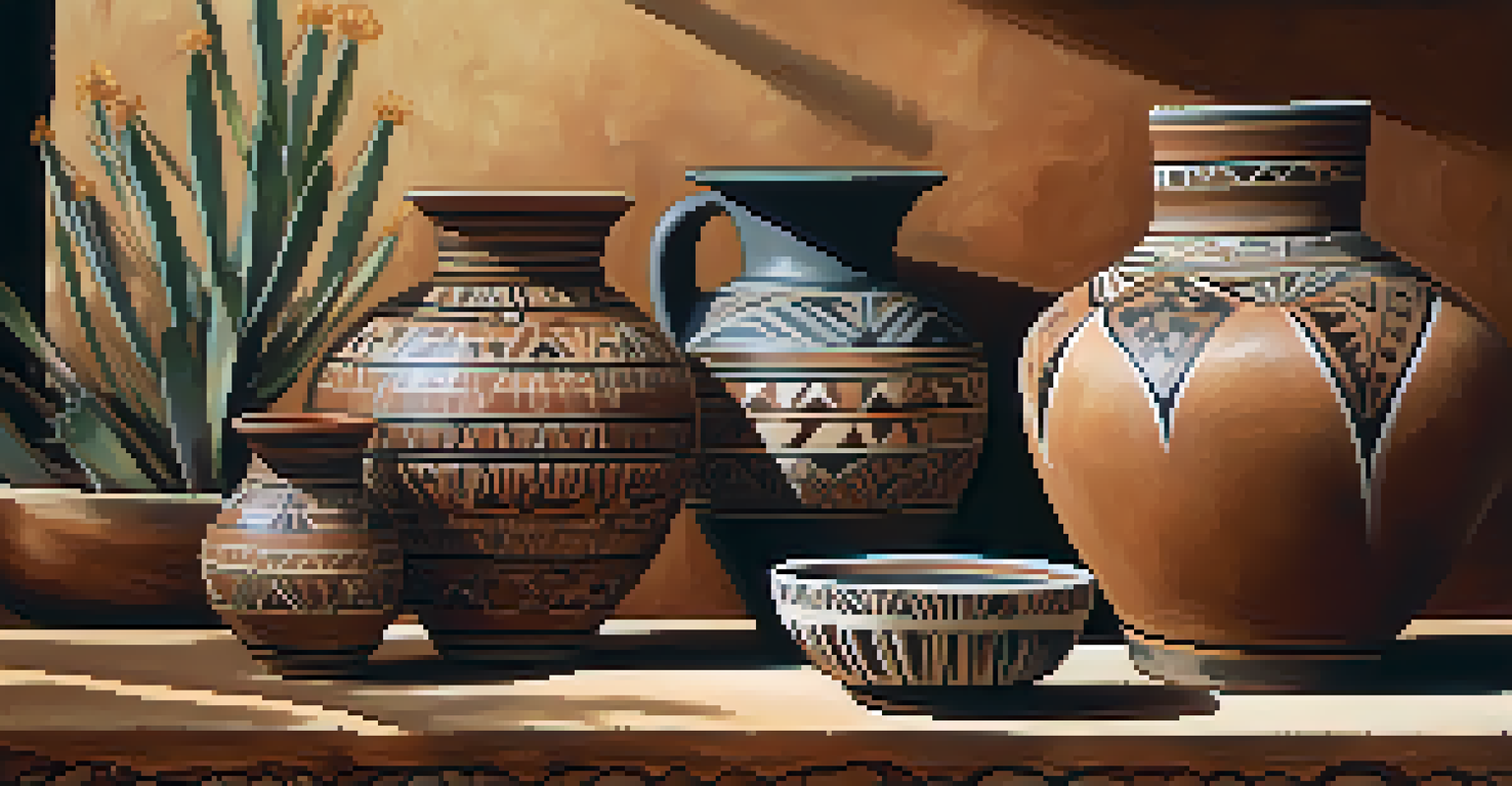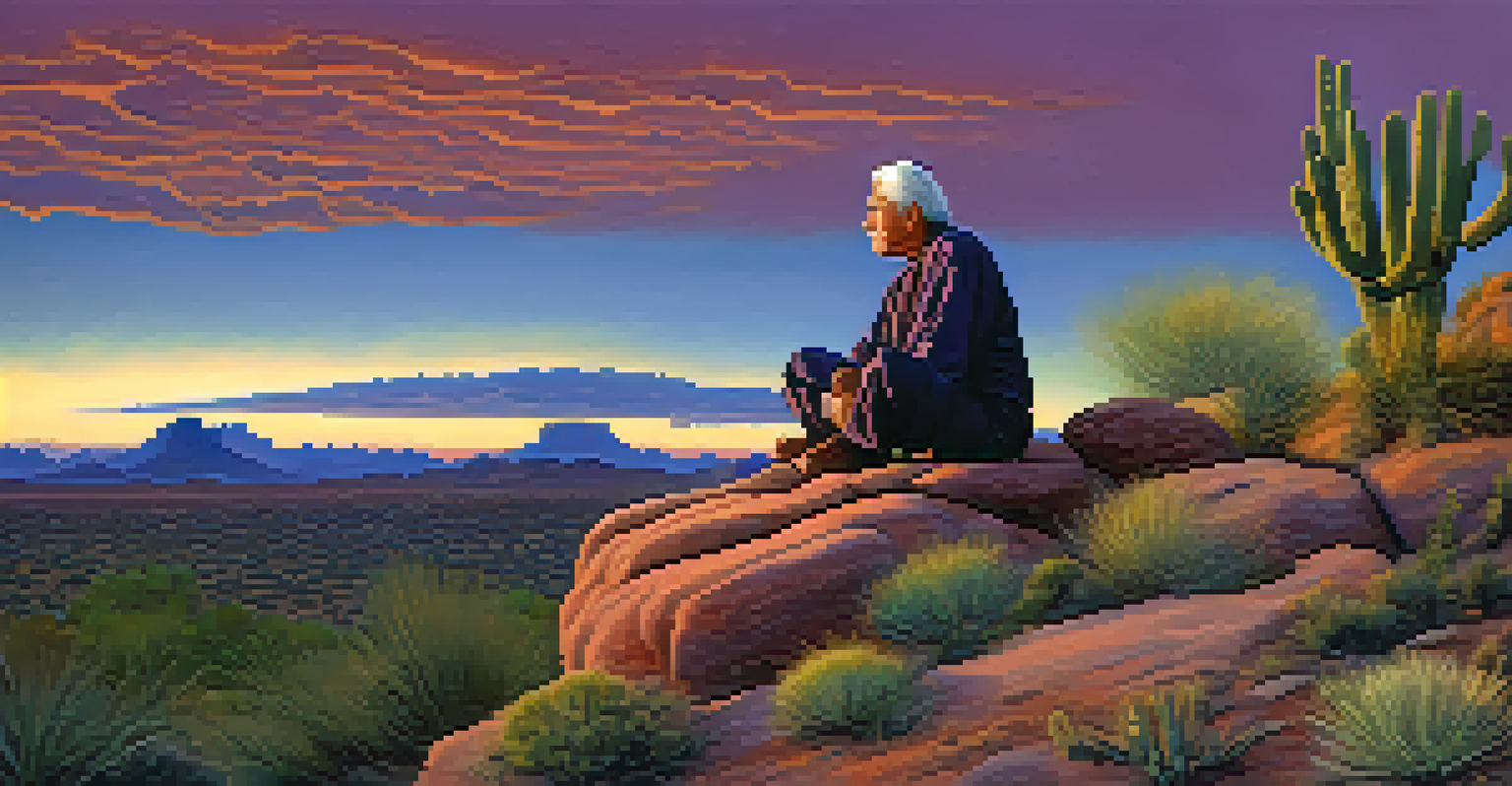Exploring Tucson's Rich Native American Heritage and Impact

An Overview of Tucson's Native American History
Tucson's history is deeply intertwined with Native American cultures, particularly the Tohono O'odham and Pascua Yaqui tribes. These communities have lived in the Sonoran Desert for thousands of years, adapting to its challenging environment. Archaeological evidence suggests that the area has been inhabited since around 12,000 B.C., showcasing a rich tapestry of traditions and lifestyles.
The preservation of our native languages is not just a matter of communication; it is essential to the survival of our culture and identity.
The Tohono O'odham, known as the 'Desert People,' have a profound connection to the land, illustrated by their agricultural practices and seasonal migrations. Meanwhile, the Pascua Yaqui, who have also thrived in this region, bring their unique customs and traditions, contributing to Tucson's cultural mosaic. Understanding this history helps to appreciate the foundations upon which Tucson stands today.
As we delve deeper into Tucson's heritage, it's essential to recognize how these tribes have not only survived but thrived, preserving their languages, arts, and spiritual beliefs. This resilience is a testament to their enduring spirit and connection to their ancestral lands.
Cultural Practices and Traditions of Native Tribes
The cultural practices of Tucson's Native American tribes are vibrant and diverse, reflecting their deep-seated beliefs and values. For instance, traditional ceremonies such as the Gourd Dance and the Deer Dance play a significant role in community life, fostering unity and spiritual connection. These events are often accompanied by music, storytelling, and colorful attire, creating a rich sensory experience.

Art is another crucial aspect of Native American culture in Tucson. Pottery, weaving, and beadwork are not merely crafts; they are expressions of identity and history. Local artisans often draw inspiration from ancestral techniques, ensuring that these traditions are passed down through generations, allowing visitors to appreciate their intricate beauty.
Rich Native American Heritage
Tucson's Native American tribes, particularly the Tohono O'odham and Pascua Yaqui, have a deep-rooted history that shapes the city's cultural identity.
Moreover, the integration of traditional practices with contemporary art forms showcases the adaptability of these cultures. This blending of old and new reflects a dynamic heritage that resonates not only with community members but also with those who visit Tucson, offering a glimpse into the rich cultural tapestry that exists here.
Significance of Native Languages in Tucson
Language is a vital component of cultural identity, and in Tucson, Native American languages hold significant importance. The Tohono O'odham and Yaqui languages are not just means of communication; they encapsulate the worldview, traditions, and histories of their speakers. Efforts to preserve and promote these languages are critical, especially as younger generations grow up in a rapidly changing world.
Art is the most beautiful of all lies; it is a reflection of our history and our values, bridging our past with the present.
Educational initiatives, such as language classes and cultural workshops, are gaining traction in Tucson, aimed at revitalizing interest in Native languages. These programs not only help in language preservation but also foster pride in cultural heritage among community members. When people hear their language spoken, it strengthens their connection to their roots.
Additionally, the resurgence of Native languages enriches the broader Tucson community. It opens doors for cultural exchange, promoting understanding and respect among different groups. In this way, the preservation of language becomes a bridge connecting past, present, and future.
Modern-Day Challenges Facing Native Communities
While Tucson's Native American tribes have a rich heritage, they also face contemporary challenges that affect their communities. Issues such as land rights, economic development, and access to healthcare remain pressing concerns. The fight for recognition and respect for their sovereignty is ongoing, as tribes navigate the complexities of modern society.
Economic disparities can hinder progress, making it difficult for many families to access necessary resources. However, initiatives aimed at sustainable development and entrepreneurship within these communities are emerging. By leveraging their cultural assets and knowledge of the land, tribes are finding innovative ways to create economic opportunities.
Cultural Practices and Resilience
Traditional ceremonies, art forms, and language preservation efforts highlight the vibrant cultural practices and resilience of Tucson's Native communities.
Despite these challenges, Tucson's Native American communities continue to demonstrate resilience. Grassroots movements and collaborations with local organizations are fostering a sense of empowerment, enabling tribes to advocate for their rights and develop strategies that honor their traditions while addressing contemporary needs.
Celebrating Native American Heritage Through Festivals
Tucson hosts several festivals that celebrate and honor Native American heritage, providing a vibrant platform for cultural expression. Events like the Tucson Meet Yourself festival showcase traditional music, dance, and food from various tribes, inviting the community to engage and learn. These celebrations foster a sense of pride among Native Americans while also educating attendees about their rich histories.
During these festivals, visitors can witness colorful performances and taste traditional dishes, creating an immersive experience. For example, the Pasqua Yaqui Tribe's annual feast days highlight their cultural heritage through rituals, dances, and communal meals. This not only preserves their traditions but also invites outsiders to appreciate the beauty and depth of their culture.
Such events serve as a reminder of the importance of cultural exchange and understanding. They create opportunities for dialogue and connection, helping to break down stereotypes and foster respect among diverse communities. Through celebration, Tucson honors its Native American roots and showcases the enduring influence of these cultures.
Native American Art: A Reflection of Heritage
Art plays a pivotal role in expressing the stories and values of Tucson's Native American tribes. From intricate pottery to stunning beadwork, each piece often carries significant cultural symbolism. Artists draw upon their heritage to create works that not only beautify but also convey messages about identity and tradition.
Local galleries and art markets frequently feature Native American artists, providing them with a platform to showcase their talents. This not only supports their livelihoods but also educates the public about the cultural significance behind their work. When people purchase these artworks, they are not just buying a product; they are investing in a story and a piece of history.
Modern Challenges and Empowerment
Despite facing challenges such as economic disparities and land rights issues, Tucson's Native tribes are advocating for their rights and finding innovative solutions for sustainable development.
Moreover, art workshops and classes foster creativity and skill-building among community members. These initiatives encourage younger generations to engage with their heritage through artistic expression, ensuring that traditions are preserved in a contemporary context. In this way, art becomes a bridge connecting the past with the present.
The Future of Native American Culture in Tucson
Looking ahead, the future of Native American culture in Tucson appears promising, thanks to ongoing efforts aimed at preservation and revitalization. Educational programs in schools are increasingly incorporating Native American history and perspectives, fostering a sense of understanding and respect among students. This shift is vital for nurturing future generations who appreciate the rich tapestry of diverse cultures.
Additionally, collaborations between Native American tribes and local governments are paving the way for greater representation and involvement in decision-making processes. By engaging in dialogues that prioritize their needs and rights, tribes can influence policies that affect their communities. This empowerment is crucial for ensuring the longevity of their cultural practices.

As Tucson continues to grow and evolve, the integration of Native American voices and traditions will play a central role in shaping its identity. By celebrating and honoring their heritage, the community can create a vibrant future that respects the past while embracing the diversity and beauty of all its inhabitants.